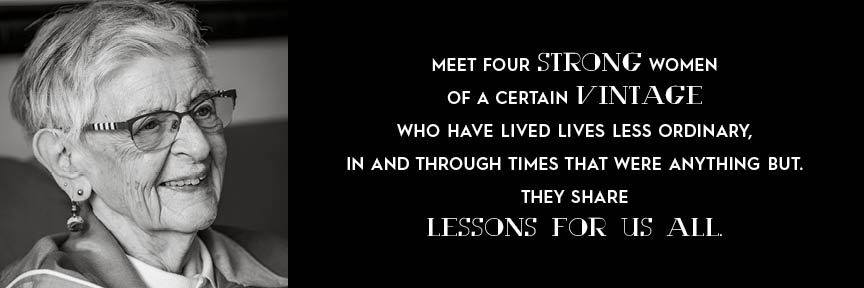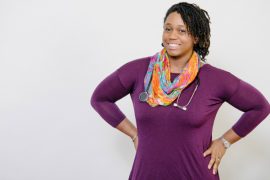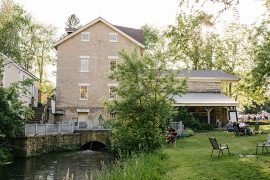Lines of Character
Meet four strong women of a certain vintage who have lived lives less ordinary, in and through times that were anything but. They share lessons for us all.
Ruth Harper | Former Teacher and Lutheran Deaconess | Age: 88
Ruth Harper lives life on her own terms. She drives her own car. Lives alone in her own non-senior, independent apartment. And is darn hard to get a hold of, her calendar is so packed with appointments and activity.
As she turns 88 this month, she is sprightly, sharp, her countenance vibrant. Self-described, she’s “the world’s greatest extrovert,” and a true wit. To know her is to be delighted.
And to get shown up at the gym, where she works out before the sun’s up with a trainer, and on her own, three to four times a week.
Raised in Minneapolis, she grew up with four sisters, one brother and two parents who believed, at a time when many people didn’t, that their girls would become women of great potential who should be aptly prepared. “My parents sent us to college preparatory school. All of us girls went to college. I have a master’s degree, one of my sisters got a Ph.D.” Hers was a family bent on self-determination, doubters be damned.
“I grew up thinking everyone went to college,” she adds. Despite being dyslexic— which went undiagnosed until her 40s—Harper attended Macalaster College then, in 1957, attended and later became the first woman to graduate from Pacific Lutheran Theological Seminary in Berkeley, California.
“That all has always been important to me,” she says, speaking of education, her faith and her own choices. “My family wasn’t Lutheran”—she was raised American Baptist—“but they supported me.”
Paving her way in the seminary Harper didn’t always feel welcomed, particularly by one disbelieving professor. “He thought we girls weren’t smart enough to take his biblical studies class. I stood it for a week,” she says, irritated. After her protest, another professor and the dean ensured her rightful seat in class.
Another woman in the seminary never followed Ruth to that class. “I finally figured it out,” she says. “I was there to get my MA, she was there to get her Mrs. We both did.”
She first discovered the joy of teaching when asked, at age 14, to lead Sunday school classes. Since then, she’s lived in at least five states to minister and to teach at all kinds of schools—small, rural schools were her favorite, for the personal connections. An avid sports fan, she coached women’s basketball, and was chief score keeper—for the doubters who would be boys and men—at boys’ basketball games, where she aptly called a technical foul no one else caught. They never doubted her again.
When Harper became a deaconess in the Lutheran Church, she chose not to marry or have children. “I might have liked to have children,” she says, offhandedly, “but I was so busy having fun teaching other people’s children that I hardly thought about it!” Plus, she adds, with a signature humorous twist, “Well, I never found anyone I liked enough to look at over the breakfast table!”
Serving the church, she also encountered resistance, doubters, and was given responsibilities below her abilities and education. “Their idea that women could not manage what men could manage just blew my mind,” she adds, aghast.
She was even harassed, which was met with silence. Harper reached out to the church leadership, including the bishop. “I never heard back,” she says with clear disgust.
Back then, she reflects, “Lutherans weren’t very accepting of women—but that was true of a lot of other churches.”
And so, when things didn’t meet with her satisfaction, she would take her talents and tenacity to serve and teach elsewhere.
As important as enjoying her career was enjoying life. Harper has traveled to Europe at least 15 times, with a sister, a friend, alone. Today she’s adamant: If she wants to keep moving, she’s got to keep moving. “Some of my friends think I’m insane,” she says, laughing about her gym and fitness commitment. A minister of good health, she worries about seniors who don’t move around. “It’s not good. Older people really need to embrace life and live it fully.” In her work she’s seen the lack of mobility, and ensuing spiral of decline. And she’s determined. “I made up my mind that wouldn’t happen to me.”
Embracing all her life’s choices and experiences Harper reflects, “I have learned a lot.” And with a giggle and a raised brow adds, “Oh, I’ve had a wild life.” And so the fun continues. She makes sure of it. – Kate Bast
WISDOM. IN HER WORDS:
HAVE A SENSE OF HUMOR. Especially when you teach others, don’t take yourself so seriously—you can make mistakes. In areas where you work with people, you need fairness and honesty. If you’re wrong, admit it!
ENJOY WHAT YOU DO, AND WHO YOU’RE WITH. Figure out in your life the things that are most important. Get to know people—that’s what makes life interesting and fun. We need to connect with our elders, to understand the lives of our grandparents.
LIVE WISELY AS YOU AGE. Tell your stories. Look to the future. Don’t feel sorry for yourself more than 10 minutes. Keep track of what’s going on in the world— don’t just listen mindlessly, make an effort to find out the background. Canes, hearing aids—use them! You are older when you try to get by without them. Don’t be afraid to buy something nice— it’s all about maintaining vitality.
KEEP MOVING. The most important thing we can teach people at middle age is to keep moving—both mentally and physically. Believe me, we slide down faster than fast.
DON’T LET PEOPLE MAKE YOU FEEL OLD. Call people out on it when they treat you like you’re old. Say ‘I really can do that. I can understand you. Don’t treat me like I have no brain cells.’




